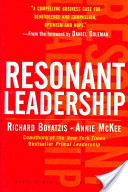I truly live by William Blake’s famous quote, “The road of excess leads to the palace of wisdom.” The problem is that road goes in two directions, with many turns, stops and hills. The road of excess can make you tired, stressed and dissonant. On the other hand, it can make you energized, healthy, and focused. As for the middle path, I don’t know much about that path. I do know that learning about Emotional Intelligence and Resonant Leadership has helped me tremendously.
Emotional intelligence has been defined as the ability to recognize how leaders understand themselves and others (Goleman, et al., 2002). Leaders, including myself, are prime candidates for stress, weight issues, and health issues (Boyatzis & McKee, 2006). Using the concept of emotional intelligence, Boyatzis and McKee (2006) proposed that leaders utilize a process of renewal to deal with the sacrifices that have been inherent in today’s work world. When leaders do not renew themselves, they run the risk of becoming dissonant, and therefore, ineffective or burnt out.
Ironically, being a principal causes a lot of stress and anxiety. It also has an energizing effect, but these two forces do not always balance each other. Through much reflection, I have found that I am a potential candidate for Sacrifice Syndrome (Boyatzis & McKee, 2006). I tend to volunteer for activities even when my plate is full. I have a tough time declining opportunities because I feel that everything I do has the potential to benefit my professional growth and school community. In my world, there is always another mountain to climb. In the process, there are occasions when I become stressed out and continue to take on those potentially advantageous opportunities that end up becoming more detrimental to my well-being and supersede the intended beneficial outcomes.
When I am feeling well, I tend to be more charismatic and full of energy. I realize this because others point it out to me. “Hey Spike, you seem full of energy!” or “Wow, I wish I had your energy!” On the other hand, when I am stressed out, I have people tell me, “You look tired,” or “Is everything OK?” I am the kind of person who wears my emotions on my sleeve. In the fall, sometime after Thanksgiving, I knew I was deep in the cycle of sacrifice. I was tired all of the time. Although it took me a few weeks to get out, I was able to recognize, reflect and make the necessary changes to break that cycle. As a leader, I know that I must be awake, aware, and attentive. In order to achieve this, I need to adhere to a Cycle of Renewal (Boyatzis & McKee, 2006).
Maintaining a Cycle of Renewal has become more difficult as I grow older and add more responsibilities to my plate. I used to run marathons, triathlons, and hike mountains. Since that time, I have fathered two children and earned both a masters and doctoral degree. Plus, I became a principal. It has only been in the last year that I have truly committed myself to a new cycle of renewal. It has helped that the kids are more independent and out of diapers. I go to karate three days a week, eat as healthy as possible, meditate, and spend time with my family. I try to laugh, a lot. I like watching funny things on TV. I dance with my wife and children. We have competitions of all sorts. I listen to music and enjoy reading.
So now, I maintain two blogs, participate on twitter, and am a building principal (January 30, 2012 posts: What is it like being a principal? Are you in meetings all day?). I know my colleagues wonder, “How does he do it?” As I stated earlier, I travel on the road of excess. On that road, I balance the cycle of sacrifice and the cycle of renewal. Want to learn more about the cycle of sacrifice, renewal or Emotional Intelligence? Here are some resources:
- http://www.iveybusinessjournal.com/topics/leadership/mindfulness-hope-and-compassion-a-leader%E2%80%99s-road-map-to-renewal
- http://books.google.com/books/about/Resonant_leadership.html?id=QWRaHu6ovv8C
- http://psychology.about.com/od/personalitydevelopment/a/emotionalintell.htm
- http://helpguide.org/mental/eq5_raising_emotional_intelligence.htm








